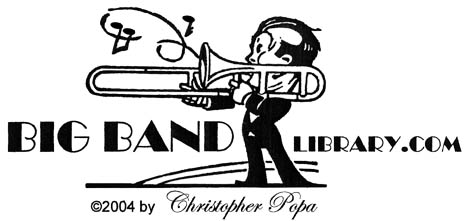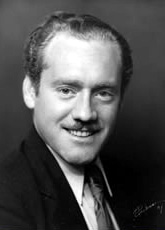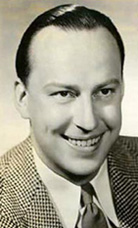
But, according to author-historian George T. Simon, DeLange quickly realized that he'd need many more songs for the group to play, so he offered Hudson a partnership in exchange for his arranging talents.
Hudson already had a number of successful, individual credits, such as White Heat and Jazznocracy, two jazz tunes played by Jimmie Lunceford's orchestra. In 1936 and '37, Hudson would add several more, with the assistance of Mitchell Parish and Irving Mills, namely Organ Grinder's Swing, another Lunceford feature; Sophisticated Swing, which was recorded by Bunny Berigan and (in 1956) by Jimmy Dorsey; and Mr. Ghost Goes to Town, a Tommy Dorsey selection.
Will Hudson vital stats:
given name Will Hudson
birth Mar. 8, 1908, Barstow, CA
death Jul. 1981
education Southeastern High School, Detroit, MI; graduate and post-graduate studies at
Juilliard School of Music, New York City, 1952-53
military service United States Army Air Force, 1943-45
memberships ASCAP, 1934-
Eddie DeLange vital stats:
given name Edgar DeLange
birth Jan. 12, 1904, Long Island City, NY
death Jul. 13, 1949, Los Angeles, CA
education Phi Beta Kappa, University of Pennsylvania, Philadelphia, PA, grad.1926
memberships ASCAP, 1934-
With the Hudson-DeLange Orchestra, much (but not all) of the time DeLange led the band and Hudson stayed behind the scenes.
The group appeared principally in eastern colleges, ballrooms, and hotels; it is reported on DeLange's official website (created decades after his death) that from 1936-38 they played over 200 ballroom dates throughout New England and the Midwest, as well as the Terrace Room of the New Yorker Hotel.
They also were signed to Brunswick Records.
Among the sidemen in the band were, at various times, Steve Lipkins (trumpet), Gus Bivona (clarinet and alto saxophone), Bus Etri (guitar), Doc Goldberg (bass), and Billy Exner (drums).
But in early 1938, Hudson and DeLange decided to go their separate ways.
Hudson continued on the road with a group under his own name. He recorded for Varsity in 1940 with, among others, George Siravo (alto sax) and Bobby Dukoff (tenor sax), but disbanded within a few years.
Hudson entered the U.S. Army Air Force on March 9, 1943, and did some arranging for Glenn Miller's AAF Orchestra.
He evidently was living in Charleston, South Carolina at the time of his death in 1981.
Meanwhile, DeLange, with his own band, made a lot of records for Bluebird in 1939, the majority of them novelties.
With new songwriting partner Jimmy Van Heusen, he wrote the lyrics for Deep in a Dream, All I Remember Is You, and Looking for Yesterday, performed by Artie Shaw; Heaven Can Wait, recorded memorably by Tommy Dorsey; Darn That Dream, played by Benny Goodman; and All This and Heaven Too, done by both Jimmy Dorsey and Charlie Barnet.
And working with various other composers, DeLange also did the words to Shake Down the Stars, which Glenn Miller helped to popularize; Just As Though You Were Here, another Tommy Dorsey recording; The Man with the Horn and Velvet Moon, featured by Harry James; Do You Know What it Means to Miss New Orleans, a Louis Armstrong selection; and Without Music, a wonderful record by Tex Beneke and The Glenn Miller Orchestra.
DeLange died in 1949, and 40 years later was posthumously inducted into The National Academy of Popular Music’s Songwriters Hall of Fame.
sources:
"DeLange, Edgar," in ASCAP Biographical Dictionary, Fourth Edition (New York City:
Jacques Cattell Press, 1980), p.118.
Eddie DeLange Songs [ website ], eddiedelange.com.
"Hudson, Will," in ASCAP Biographical Dictionary, Fourth Edition (New York City:
Jacques Cattell Press, 1980), p.239.
Edward F. Polic, The Glenn Miller Army Air Force Band: Sustineo Alas / I Sustain the
Wings, Volume One (Metuchen, NJ: The Scarecrow Press, Inc., 1989), p.673.
Brian Rust, The American Dance Band Discography 1917-1942: Volume 1 (New Rochelle,
NY: Arlington House, 1975), pp.397-398 and 823-826.
George T. Simon, "Hudson-DeLange," in The Big Bands (New York City: The Macmillan
Company, 1967), pp.259-260.
Social Security Death Index.
I would like to expand this tribute, if possible, with a new interview of someone who was important to Will Hudson's and Eddie DeLange's lives and careers. Are you an alumnus of their band, a member of one of their families, or a collector who is knowledgeable about their accomplishments? Please contact me via e-mail
return to "Biographical Sketches" directory
go to Big Band Library homepage
The big bands are back
in a new and exciting way!
HUDSON-DeLANGE
"SOPHISTICATED SWING"
by Music Librarian CHRISTOPHER POPA
August 2008
They worked well together as a songwriting team, co-authoring in 1934, among other titles, Moonglow, which became a great standard of popular music. Will Hudson composed its melody, while Eddie DeLange wrote the lyrics.
DeLange also added words to Duke Ellington's 1935 tune, Solitude.
Then, with the rise of swing shortly thereafter, DeLange had the idea to start a big band.


Will Hudson Eddie DeLange